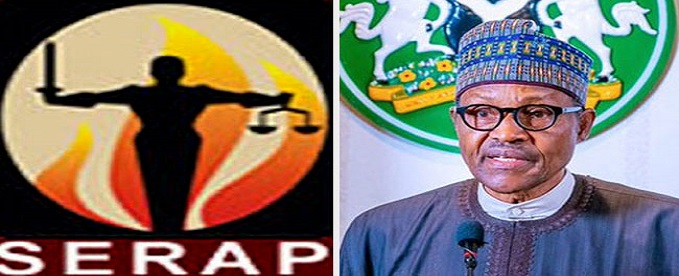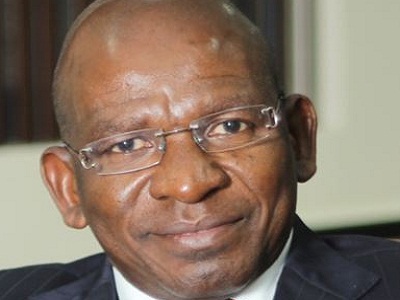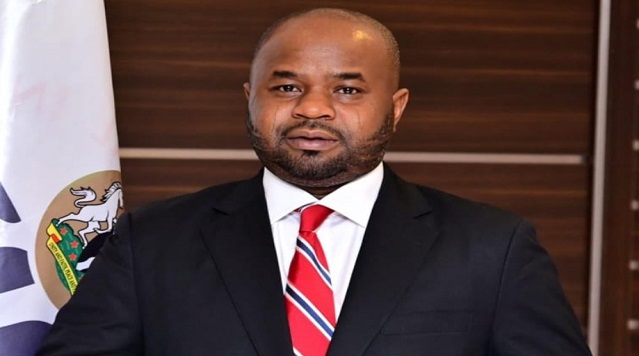News
SERAP Sue Buhari Over N5m Fine on Channels TV for Interview with Datti Baba-Ahmed

Socio-Economic Rights and Accountability Project (SERAP) and Centre for Journalism Innovation and Development (CJID) have filed a lawsuit against President Muhammadu Buhari over the N5 million fine the federal government placed on Channels Television.

The National Broadcasting Commission (NBC) had recently fined Channels Television N5 million over an interview with Datti Baba-Ahmed. The NBC alleged that the interview ‘violated the NBC code.’
In the suit, both organizations are asking the court to “declare arbitrary, illegal and unconstitutional the N5m fine imposed on Channels Television over a recent interview with the Labour Party vice-presidential candidate, Datti Baba-Ahmed.”
Joined in the suit as Defendants are the National Broadcasting Commission (NBC) and Mr Lai Mohammed, Minister of Information and Culture.
However, in the suit number FHC/L/CS/616/2023 filed last week at the Federal High Court, Lagos, the plaintiffs are asking the court to determine “whether the NBC code used to impose a fine of N5m on Channels TV and the threat of ‘higher sanctions’ is not in inconsistent and incompatible with access to information and media freedom.”
The plaintiffs are asking the court for “a declaration that the NBC code used by the NBC to impose a fine of N5m on Channels TV and the threat of ‘higher sanctions’ is arbitrary, unconstitutional and unlawful, as it violates the rights to a fair hearing, freedom of expression, access to information and media freedom.”
The plaintiffs are seeking “an order setting aside the N5m fine for being inconsistent and incompatible with section 22, 36 and 39 of the Nigerian Constitution 1999 [as amended], Article 9 of the African Charter on Human and Peoples’ Rights, and Article 19 of the International Covenant on Civil and Political Rights.”
The plaintiffs are also seeking “an order directing and compelling the NBC to reverse its arbitrary and unlawful decision to impose a fine of N5m on Channels TV forthwith.”
In the suit, the plaintiffs are arguing that: “the media has the task of distributing all varieties of information and opinion on matters of general interest and public interest.”
The plaintiffs said, “Imposing any fine whatsoever without due process of law is arbitrary and unconstitutional, as it contravenes the fundamental principles of nemo judex in causa sua which literally means one cannot be a judge in his own cause and audi alteram partem which means no one should be condemned unheard.”
The plaintiffs are also arguing that “The media plays an essential role as a vehicle or instrument for the exercise of freedom of expression and access to information in a democratic society.”
The suit filed on behalf of the plaintiffs by their lawyers Kolawole Oluwadare, Andrew Nwankwo, and Ms Blessing Ogwuche, read in part: “The grounds for imposing a fine of N5m on Channels TV fail to meet the requirements of legality, necessity, and proportionality.”
“Broadcasting is a means of exercising freedom of expression. Any restrictions on freedom of expression must meet the requirements of legality, necessity, and proportionality.
“The regulation of broadcasting must aspire to promote and expand the scope of the right to freedom of expression, not restrict it.”
“The NBC Act and Broadcasting Code cannot and should not be used in a manner that is inconsistent and incompatible with plurality of voices, diversity of voices, non-discrimination, just demands of a democratic society, and the public interest.”
“The fine is arbitrary and unlawful and would have a disproportionate and chilling effect on the work of other broadcast stations and journalists and Nigerians.”
News
Trump Says He Made no Mistake Sharing Video Depicting Obamas as Apes

United States President Donald Trump has said he made no mistake for a video briefly shared on his official Truth Social account that depicted former President Barack Obama and former First Lady Michelle Obama as apes.

Former President Barack Obama
Speaking late Friday to reporters accompanying him aboard Air Force One, Trump insisted he made no mistake by sharing the video and does not need to apologise.
“I didn’t make a mistake,” he said.
Trump explained that he did not watch the entire clip before it was posted.
“I didn’t see the whole thing. I looked at the first part, and it was really about voter fraud in the machines, how crooked it is, how disgusting it is.
“Then I gave it to the people. Generally, they look at the whole thing. But I guess somebody didn’t,” he said.
When asked directly whether he condemned the video’s content, Trump replied, “Of course I do.”
The video, which was posted late Thursday, pushed a conspiracy theory about voting machines used during the 2020 election and included a racist depiction of the Obamas.
It remained on Trump’s Truth Social account for about 12 hours before being deleted on Friday morning, following widespread bipartisan calls for its removal.
The White House initially defended the post in an emailed statement to reporters on Friday morning by Karoline Leavitt, Press Secretary,.
She said, “This is from an internet meme video depicting President Trump as the King of the Jungle and Democrats as characters from The Lion King.”
Leavitt added, “Please stop the fake outrage and report on something today that actually matters to the American public.”
Hours after the statement was issued, the video was removed from Trump’s official Truth Social account.
News
Orya, Ex-NEXIM MD Jailed 490 Years for N2.4Bn Fraud

Robert Orya, former managing director, Nigerian Export-Import Bank, (NEXIM), has been sentenced to a cumulative 490 years’ imprisonment over a N2.4 billion fraud, following his conviction by a Federal Capital Territory (FCT) High Court in Abuja.

The conviction was secured by the Economic and Financial Crimes Commission (EFCC). Justice F. E. Messiri sentenced Orya to 10 years’ imprisonment on each of the 49 counts brought against him, with the sentences running cumulatively.
Orya, who headed NEXIM Bank between 2011 and 2016, was prosecuted by Samuel Ugwuegbulam, EFCC counsel.
The anti-graft agency accused him of fraudulently diverting funds belonging to the bank—charges the court held were proven beyond reasonable doubt.
Delivering judgment, Justice Messiri ruled that the prosecution successfully established its case, finding the former bank chief guilty on all 49 counts of fraud.
The conviction has been widely linked to the renewed momentum within the EFCC under Mr. Ola Olukoyede, its Chairman, whose leadership has seen a reinvigoration of the agency’s resolve to pursue high-profile corruption cases to their logical conclusion.
Since assuming office, Olukoyede has repeatedly vowed that no individual, regardless of status or past influence, would be shielded from accountability.
Under his stewardship, the EFCC has intensified the prosecution of complex financial crimes, particularly cases involving public institutions and large-scale diversion of funds.
Observers say the sentencing of a former chief executive of a government-owned bank underscores the EFCC’s determination to restore public confidence in the anti-corruption fight and sends a strong signal that financial misconduct will attract severe consequences.
The judgment is regarded as one of the most significant convictions secured against a former banking chief in recent years, reinforcing the agency’s resolve to clamp down on economic crimes within Nigeria’s financial sector.
During his tenure at NEXIM Bank, Orya was initially credited with efforts to reposition the institution to support non-oil exports and improve its financial standing after earlier setbacks.
However, his administration later became enmeshed in controversies, including allegations of loan disbursement irregularities and procedural abuses.
The case, which culminated in Thursday’s judgment, centred on findings that Orya diverted public funds estimated at N2.4 billion—offences that ultimately led to his conviction and lengthy prison sentence.
News
NRS Chairman Outlines Ways Nigeria can Move from Potential to Economic Prosperity

Zacch Adedeji, chairman of the Nigeria Revenue Service (NRS) has called for a paradigm shift in dependence on raw material exports to one that embrace ideas, innovation and the production of complex products as a pathway to sustainable economic growth and national prosperity.

Adedeji made the submission while delivering the maiden distinguished personality lecture of the Faculty of Administration, Obafemi Awolowo University (OAU), Ile-Ife, Osun State, on Thursday.
A statement by his Special Adviser on Media, Dare Adekanmbi, said Adedeji, in the lecture entitled, ‘From Potential to Prosperity: Export-led Economy’, stressed the need to rethink growth through the lens of complexity by not just producing more of the same stuff.
He lamented that Nigeria possesses a high-tech oil sector and low-productivity informal sector as well as lacking “the vibrant, labour-absorbing industrial base that serves as a bridge to higher complexity.”
The NRS boss stated that Nigeria witnessed stagnation in its exportation drive for three decades between 1998 to 2023, and only added six new products in its export basket list between 2008 and 2023.
“Because of our current position, the Harvard Atlas concluded that we are positioned to take advantage of very few opportunities to diversify using what we already know.”
Adedeji urged Nigeria to learn from the world by comparative study of success and failure like Vietnam, Bangladesh, Indonesia, South Africa and Brazil.
“We are not just looking at numbers in a vacuum; we are looking at the strategic choices made by nations like Vietnam, Indonesia, Bangladesh, Brazil, and South Africa over the same twenty-five-year period. While there are many ways to under perform, the path to success is remarkably consistent: it is defined by a clear strategy to build economic complexity.
“When we put these stories together, the divergence is clear. Vietnam used global trade to build a resilient, complex economy, while the others remained dependent on natural resources or a single low-tech niche.
“There are three big lessons here for us in Nigeria as we think about our roadmap. First, avoiding the resource curse is necessary, but it is not enough. You need a proactive strategy to build productive capabilities.
“Vietnam’s success came from integrating itself into Global Value Chains (GVCs). They positioned themselves as the assembly hub for the world’s electronics, importing high-tech parts and exporting finished products.
“This allowed them to “borrow” technology and management skills from abroad to build their own know-how.
“Nigeria, on the other hand, remains a supplier of raw materials to these chains, not an active participant within them. We must realise that productive capabilities are not permanent. The examples of South Africa and Brazil show us that you can actually lose your industrial edge if you are not careful. Over-reliance on the easy path of resource extraction creates economic and political incentives that crowd out the difficult, long-term work of building an industrial base.”
He added that for Nigeria, which is at an even earlier stage of development and even less diversified than these nations, the warning is stark.
“Relying solely on our natural endowments isn’t just a path to stagnation; it’s a path to regression. The global economy increasingly rewards knowledge and complexity, not just what you can dig out of the ground. If we want to move from potential to prosperity, we must stop being just a source of raw materials and start being a source of ideas, innovation, and complex products.
He added that President Bola Tinubu has already begun the difficult work of rebuilding the economy to ensure collective knowledge to innovate, produce and build a resilient economy.
“The journey from potential to prosperity is not a short one, but with the right map and the right resolve, it is a journey we can finally complete,’ he added.

 General News2 days ago
General News2 days agoGlobacom Donates ₦1Bn to Lagos State Security Trust Fund

 Telecom3 days ago
Telecom3 days agoMTN Guns for $2.76bn IHS Towers Buyout in African Telecom Power Grab

 E-Financial3 days ago
E-Financial3 days agoIncentives alone won’t win over Africa’s next billion fintech users — Kuda MFB MD

 Telecom3 days ago
Telecom3 days agoGoogle Calls on Africa’s AI Trailblazers for 10th Startup Accelerator Cohort

 E-Business3 days ago
E-Business3 days agoFirm Reviews the Evolution of Phishing Threats in 2025

 Telecom2 days ago
Telecom2 days agoAirtel Nigeria Commits to Upgrade of its Network Infrastructure for Improved Quality of Service

 General News3 days ago
General News3 days agoEdTech Platform Unveils over 5,000 Self-Paced Courses for Skills, Knowledge, and Literacy

 E-Business2 days ago
E-Business2 days agoPwC Reveals AI Scaling Gap Slows Africa’s Digital Transformation























